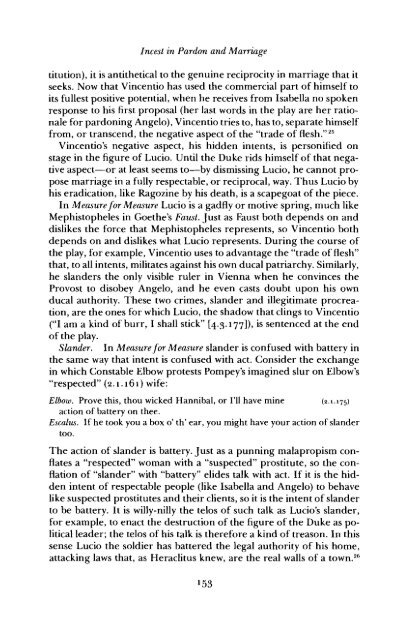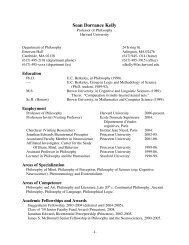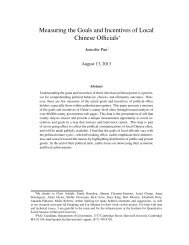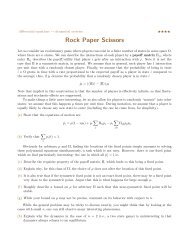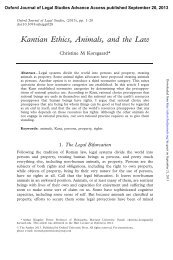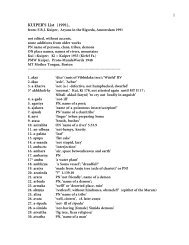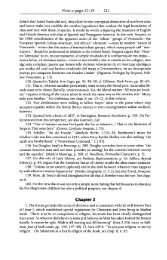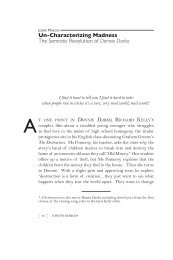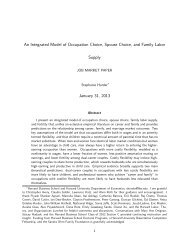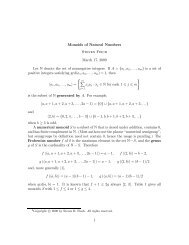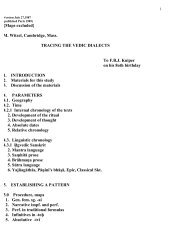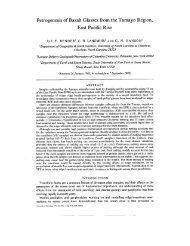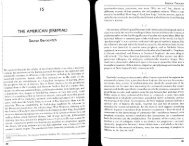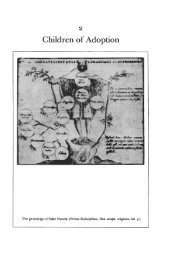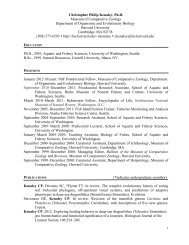Incest in Pardon and Marriage - People Fas Harvard
Incest in Pardon and Marriage - People Fas Harvard
Incest in Pardon and Marriage - People Fas Harvard
You also want an ePaper? Increase the reach of your titles
YUMPU automatically turns print PDFs into web optimized ePapers that Google loves.
<strong>Incest</strong> <strong>in</strong> <strong>Pardon</strong> <strong>and</strong> <strong>Marriage</strong><br />
titution), it is antithetical to the genu<strong>in</strong>e reciprocity <strong>in</strong> marriage that it<br />
seeks. Now that V<strong>in</strong>centio has used the commercial part of himself to<br />
its fullest positive potential, when he receives from Isabella no spoken<br />
response to his first proposal (her last words <strong>in</strong> the play are her ratio-<br />
nale for pardon<strong>in</strong>g Angelo), V<strong>in</strong>centio tries to, has to, separate himself<br />
from, or transcend, the negative aspect of the "trade of flesh."25<br />
V<strong>in</strong>centio's negative aspect, his hidden <strong>in</strong>tents, is personified on<br />
stage <strong>in</strong> the figure of Lucio. Until the Duke rids himself of that nega-<br />
tive aspect-or at least seems to-by dismiss<strong>in</strong>g Lucio, he cannot pro-<br />
pose marriage <strong>in</strong> a fully respectable, or reciprocal, way. Thus Lucio by<br />
his eradication, like Ragoz<strong>in</strong>e by his death, is a scapegoat of the piece.<br />
In Measure for Measure Lucio is a gadfly or motive spr<strong>in</strong>g, much like<br />
Mephistopheles <strong>in</strong> Goethe's Faust. Just as Faust both depends on <strong>and</strong><br />
dislikes the force that Mephistopheles represents, so V<strong>in</strong>centio both<br />
depends on <strong>and</strong> dislikes what Lucio represents. Dur<strong>in</strong>g the course of<br />
the play, for example, V<strong>in</strong>centio uses to advantage the "trade of flesh"<br />
that, to all <strong>in</strong>tents, militates aga<strong>in</strong>st his own ducal patriarchy. Similarly,<br />
he sl<strong>and</strong>ers the only visible ruler <strong>in</strong> Vienna when he conv<strong>in</strong>ces the<br />
Provost to disobey Angelo, <strong>and</strong> he even casts doubt upon his own<br />
ducal authority. These two crimes, sl<strong>and</strong>er <strong>and</strong> illegitimate procrea-<br />
tion, are the ones for which Lucio, the shadow that cl<strong>in</strong>gs to V<strong>in</strong>centio<br />
("I am a k<strong>in</strong>d of burr, I shall stick" [4.3.177]), is sentenced at the end<br />
of the play.<br />
Sl<strong>and</strong>er. In Measure for Measure sl<strong>and</strong>er is confused with battery <strong>in</strong><br />
the same way that <strong>in</strong>tent is confused with act. Consider the exchange<br />
<strong>in</strong> which Constable Elbow protests Pompey's imag<strong>in</strong>ed slur on Elbow's<br />
"respected" (2.1.16 1 ) wife:<br />
Elbow. Prove this, thou wicked Hannibal, or I'll have m<strong>in</strong>e (2.1.175)<br />
action of battery on thee.<br />
Escalus. If he took you a box o' th' ear, you might have your action of sl<strong>and</strong>er<br />
too.<br />
The action of sl<strong>and</strong>er is battery. Just as a punn<strong>in</strong>g malapropism con-<br />
flates a "respected" woman with a "suspected" prostitute, so the con-<br />
flation of "sl<strong>and</strong>er" with "battery" elides talk with act. If it is the hid-<br />
den <strong>in</strong>tent of respectable people (like Isabella <strong>and</strong> Angelo) to behave<br />
like suspected prostitutes <strong>and</strong> their clients, so it is the <strong>in</strong>tent of sl<strong>and</strong>er<br />
to be battery. It is willy-nilly the telos of such talk as Lucio's sl<strong>and</strong>er,<br />
for example, to enact the destruction of the figure of the Duke as po-<br />
litical leader; the telos of his talk is therefore a k<strong>in</strong>d of treason. In this<br />
sense Lucio the soldier has battered the legal authority of his home,<br />
attack<strong>in</strong>g laws that, as Heraclitus knew, are the real walls of a town.26


